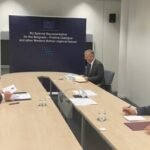Two days ago, the European Union Office in Kosovo distributed a blog by the EU High Representative Josep Borrell regarding the Kosovo-Serbia dialogue, reflecting on the process shortly before his departure from this position.
Borrell summarized the developments in the dialogue, mentioning dangerous moments such as the protests of northern Serbs, which injured nearly 100 KFOR soldiers, and Banjska, where a Kosovo police officer was killed.
Borrell said that soon, other people would take over the dialogue in Brussels, who, according to him, will closely monitor Kurti and Vučić.
He stated that the normalization of relations between Kosovo and Serbia is at the heart of the EU’s engagement in the Western Balkans.
He also emphasized that it is essential to unlock a European future for both parties and to strengthen security and stability in the region.
The conditioning of Kosovo’s EU membership on the results of the dialogue was commented on for the newspaper “Bota sot” by Amir Shabani, an expert on international relations.
Shabani considered it unfair to blame both parties for the lack of results in the dialogue, emphasizing that it was Serbia that attacked Kosovo and was not punished for its actions.
“Borrell is now ending his mandate as the EU’s high representative for foreign policy, and in this context, he provided a summary of the Kosovo-Serbia dialogue.
He accurately presented the progress of this dialogue, with the challenges and successes achieved (as far as they were), but he essentially blames the leaders of the two countries who have not helped the progress of this dialogue. However, in fact, the blame should be more one-sided, specifically towards Serbia, as it has constantly obstructed the finding of any solution or even rejected the same. Serbia attacked Kosovo and killed police officers, yet this action, among others, has remained unresolved and without deserved punishment. Therefore, I think that if Serbia were ‘tightened’ by European diplomats, we would see more progressive results towards the dialogue,” Shabani emphasized.
He considered the conditioning of Kosovo’s membership in EU structures with the establishment of the association as absurd.
“As for the conditioning for membership in the Council of Europe, which concerns the Association, I think it is absurd, since the Association is Vučić’s trap plan in Kosovo to create a Serb Republic similar to Bosnia and Herzegovina. The European Union, knowing and seeing these facts, should not allow Serbia to play such dangerous and destructive games for the region, because such an action would bring new geopolitical influence from Serbia’s allies, such as Russia and China,” he concluded.







